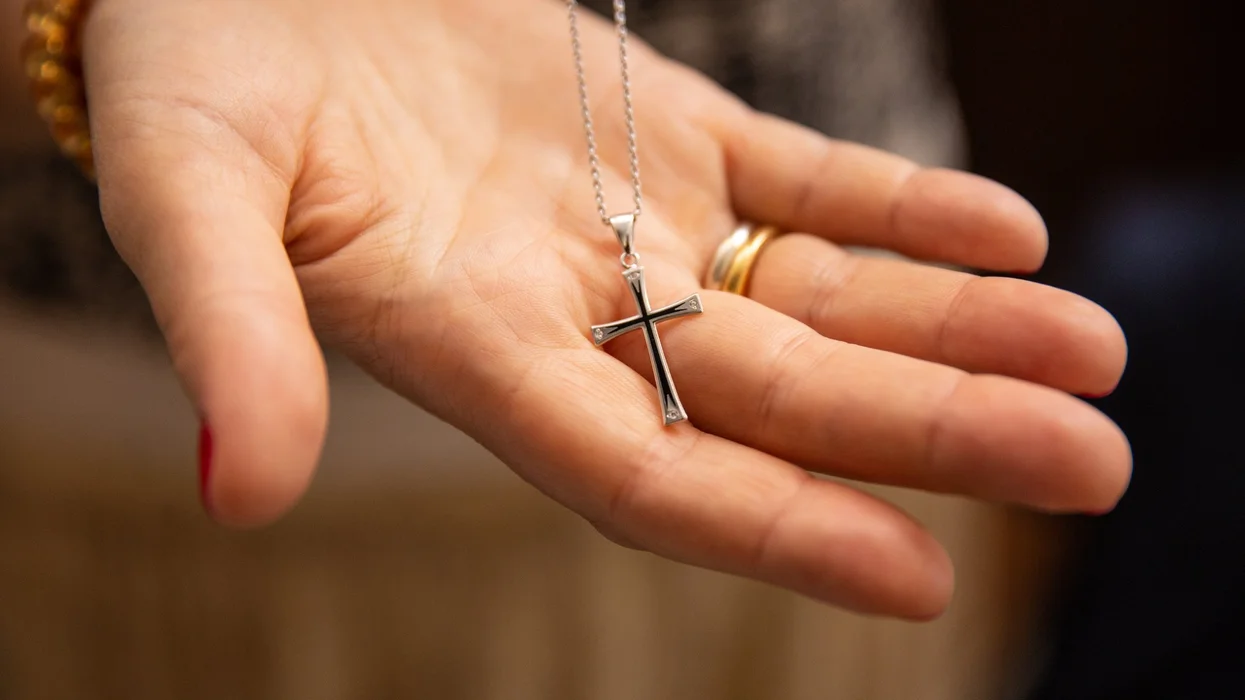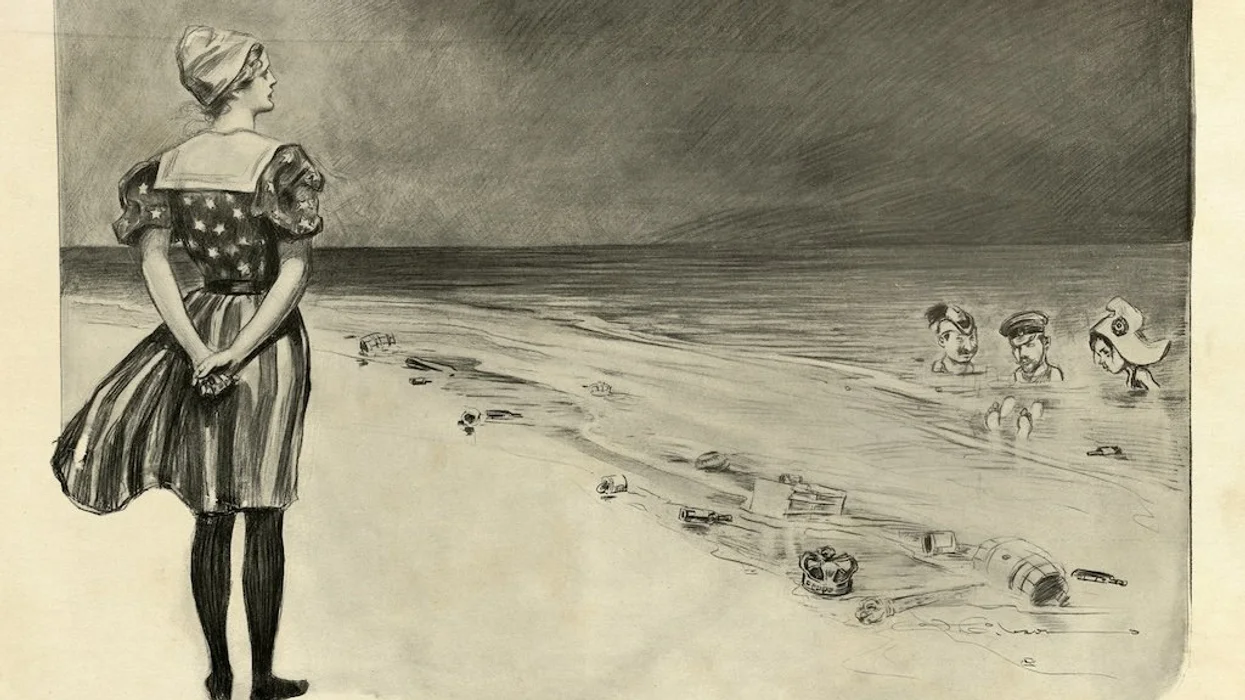Police detective Lt. Joe Kenda—having solved over 400 murder cases during his career—has a hit television program, “
Homicide Hunter.”
The real-life Kenda narrates cases as a young actor portrays him in re-enactments. Kenda’s dead-pan narration has popularized the phrase he often uses, “Well, my, my, my...” whenever a new piece of evidence suddenly leads to a suspect. Confident of this new lead, Kenda finishes with, “you are the guy I’m looking for, aren’t you?”
 In this June 4, 2009 file photo, Egyptian villagers watch a live broadcast of a speech by U.S. President Barack Obama is seen on screen at a coffee shop in Qena, south Cairo, Egypt when he was calling for a new beginning between the United States and Muslims in his speech delivered at Cairo University in Egypt. (AP Photo/File)
In this June 4, 2009 file photo, Egyptian villagers watch a live broadcast of a speech by U.S. President Barack Obama is seen on screen at a coffee shop in Qena, south Cairo, Egypt when he was calling for a new beginning between the United States and Muslims in his speech delivered at Cairo University in Egypt. (AP Photo/File)
The first part of the Kenda phrase immediately came to mind earlier this month when President Barack Obama said something in an interview, bringing into question a party line to which he has adhered his entire time in office. Why, into his eighth and final year in office, would he suddenly offer up a statement making that party line suspect?
To better understand Obama’s “Aha” Kenda moment, we need re-visit his party line about Islam.
Ever since taking office, Obama has assured us, as one who grew up learning Islam, it is a “religion of peace.” He has described the call to prayer as “one of the prettiest sounds on Earth at sunset.” He has refused, any time an act of terrorism is committed by one who is Muslim and may even have shouted “Allah Akbar” during an attack, to recognize any linkage to Islam. Obama’s rationale is such a perpetrator—by virtue of committing an act of violence—could not be a true Muslim; he is one who has hijacked Islam. Such is the case because “Islam has a proud tradition of tolerance.”
Not only are we to accept these assertions, but Obama warns us, “the future must not belong to those who slander the prophet of Islam.” Thus, non-believers questioning Islam slander its prophet.
Stripping Obama’s party line of its fluff, the basic premise is all violence is anathema to Islam. Like oil and water, they simply do not mix.
This belief is such a part of Obama’s psyche, it was evidenced by his response to the 2015 Charlie Hebdo attack by Muslims in Paris. The focus of his comments were not on catching the perpetrators or fighting Islamic extremism but was a vow to fight Islamophobia!
In the aftermath of this attack, when asked if plans were in place to raise threat levels in the U.S., White House Press Secretary Josh Earnest suggested the job to be done was to defend Islam and teach Americans about its tolerance. Thus, as non-Muslims were being slain by Muslims, Obama’s party line continued to assure the former the latter were tolerant.
Interestingly, some Muslim leaders themselves began to suggest otherwise. But even this Obama refused to acknowledge.
In 2014, Egyptian General Abdul Fattah Al-Sisi, who overthrew the brutal Muslim Brotherhood leadership Obama had supported, made a bold statement that has undoubtedly targeted him for assassination. Unlike Obama, who tells us the greatest threat to mankind is climate change, Sisi suggested the greatest threat to the Muslim world is unreformed Islam.
Sisi explained, “Religious discourse is the greatest battle and challenge facing the Egyptian people, pointing to the need for a new vision and a modern, comprehensive understanding of the religion of Islam—rather than relying on a discourse that has not changed for 800 years.”
Sisi’s “800 years” comment was a reference to the year 1258 when Islamic religious scholars of the day reviewed Islamic teachings, giving their own interpretations. Their review was known as “ijtihad.” These 13th century scholars unabashedly concluded, since they represented the greatest Islamic scholarly minds of all time—past, present and future—the “gates” to any future ijtihad were forever closed.
While Sisi’s clarion call for the gates of ijtihad to be re-opened so religious reform can follow, it went ignored by Western media—and Obama. Representing perhaps the greatest opportunity in modern times to re-examine Islam’s belief system—one emanating from within the Muslim community itself—it met silence from Obama.
At the time Sisi made this call, Obama was one year into his second term in office. Sisi’s reformation call undermined Obama’s party line on Islam. Having chosen to “speak no evil” about it, how then could Obama justify supporting Sisi’s call? His support would have begged the issue that something, in fact, is inherently wrong with Islam—linking it to violence.
We now come to our, “Well, my, my, my” moment.
After seven years in office and failing to utter a single negative comment about Islam, Obama makes an astonishing revelation. He admits “some currents of Islam” are in need of reformation.
Interviewed in the April 2016 issue of “The Atlantic,” Obama said of his 2009 Cairo “I am one of you” speech and apology to the Muslim world for American exceptionalism [emphasis added]:
“I was hoping that my speech could trigger a discussion, could create space for Muslims to address the real problems they are confronting—problems of governance, and the fact that some currents of Islam have not gone through a reformation that would help people adapt their religious doctrines to modernity.”
This statement is telling for two reasons.
First, it tells us Obama is a grandiose narcissist. Self-absorbed with an overwhelming sense of superiority, he believed his Cairo speech would cause the Muslim world to undergo an “aha” moment and modernize their religion. Obama, unsurprisingly, failed to understand Islam too suffers from grandiose narcissism.
Second, while not stating it directly, suggesting Muslims “adapt their religious doctrines to modernity,” involves major changes to an Islam committed to but one goal—its establishment as the world’s dominant religion, with all others subservient to it. This is Islam’s undeniable draconian call. Modernity involves removing Islam’s intolerant “currents” mandating perpetual violence to subordinate those other religions.
The gates of ijtihad may not be open but Obama has opened the gates to a reality about Islam the non-Muslim world desperately needs to understand: Absent undergoing modernity, Islam will continue to seek to suffocate all the other world religions.
–
TheBlaze contributor channel supports an open discourse on a range of views. The opinions expressed in this channel are solely those of each individual author.


 In this June 4, 2009 file photo, Egyptian villagers watch a live broadcast of a speech by U.S. President Barack Obama is seen on screen at a coffee shop in Qena, south Cairo, Egypt when he was calling for a new beginning between the United States and Muslims in his speech delivered at Cairo University in Egypt. (AP Photo/File)
In this June 4, 2009 file photo, Egyptian villagers watch a live broadcast of a speech by U.S. President Barack Obama is seen on screen at a coffee shop in Qena, south Cairo, Egypt when he was calling for a new beginning between the United States and Muslims in his speech delivered at Cairo University in Egypt. (AP Photo/File)


